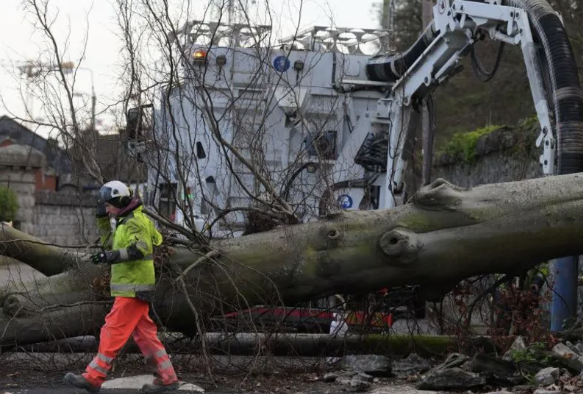
Storm Éowyn was "probably the strongest storm" to hit the UK in at least 10 years, the Met Office has said, after hundreds of thousands of people were left without power following wind gusts in excess of 100mph.
At the storm's height, nearly a million properties were without power across the British Isles and many road and rail links were blocked. A man was killed by a tree fall in Ireland as winds reached a record 114mph (183 km/h).
Parts of Scotland and Northern Ireland suffered widespread property damage and Network Rail Scotland logged nearly 400 damage incidents.
While the worst has passed, strong winds are expected to continue, and parts of England and Wales could receive up to 80mm of rainfall over the weekend.
Met Office forecasters described Éowyn as "pretty exceptional" and the most intense storm for some areas of the UK for "20-30 years".
The dead man was on Saturday identified as Kacper Dudek, 20, who was killed when a tree fell on his car at in Co Donegal, which experienced the worst gusts.
A yellow warning for strong winds is in place for much of Scotland until 3pm on Saturday, where gusts could reach 50-60mph inland, 60-70mph on exposed coasts and hills and possibly 70-80mph in the Northern Isles.
A yellow ice warning covers the East, South East and South West of England, East and West Midlands, and parts of Wales until 10am.
BBC Weather's Helen Willetts said Éowyn had by Saturday morning whisked off into the North Sea - but severe weather was still a possibility in many areas of the British Isles.
"The early hours saw wind gusts in Fair Isle, Scotland, to 80mph but the day ahead will see the winds gradually easing," she said.
Heavy showers, snow and squally winds will move into Northern Ireland by mid-afternoon on Saturday, and then into western England and Wales later, she added.
Gales are also expected to develop around the coasts and over hills.
In Ireland, 625,000 homes and businesses were without power on Friday evening. While tens of thousands had been reconnected by Saturday morning, engineers said it could take a "significant number of days" for the grid to be fully repaired.
Around 138,000 people were without water, a figure Irish Water said was likely to increase because of power outages at treatment plants and pumping stations.
In Scotland, power had been restored to 134,000 properties by Saturday morning. Around 30,000 remained without supply.
In Northern Ireland, 189,000 homes and businesses remained without power on Saturday morning, although supply had been restored for 96,000 customers.
Northern Ireland Electricity said it could be up to 10 days before all were back on the grid.
The infrastructure department said there were more than incidents of 1,800 fallen trees, branches, and other debris blocking roads.
Paul Morrow, group commander at Northern Ireland Fire and Rescue Service, told BBC Breakfast that scenes witnessed by his crews were "something we've never seen before".
He urged members of the public to remain cautious and heed weather warnings. "We've not moved into the recovery phase just yet," he said.
Northern Irish Education Minister Paul Givan said 60 schools had reported "significant damage to some buildings" and some may not be open on Monday.
The storm also left 20,000 properties in north-west England without power. Reconnection efforts were under way on Saturday morning.
ScotRail said engineers worked through the night on Friday to clear trees and other debris from tracks. It reported "extensive damage" to overhead lines.
The East Coast Main Line between Edinburgh and Newcastle reopened early on Saturday, Network Rail Scotland said, after fallen trees were cleared.
Edinburgh Airport said it would still be operating under "challenging conditions" on Saturday and that the disruption on Friday would have knock-on impact on services over the next few days.
Glasgow and Belfast International said passengers should continue to check the latest travel information with their airline before travelling.
CalMac, the main operator of ferries off Scotland's west coast, said it was still experiencing some disruption on Saturday morning, although the majority of ferry crossings in the Irish Sea – including those by Irish Ferries and Stena Line, both of which had to cancel services on Friday – appear to be operating normally.
National Rail said winds and rain would affect some services in northern England into Saturday.
Passengers with Avanti West Coast are advised not to travel north of Preston.
Mark Jones, who lives in Coldingham in the Scottish Borders, described Storm Éowyn hitting his area like "an earthquake".
On Friday morning, he saw his corrugated iron carport being lifted out of the ground and tipped into an area of woodland.
"I didn't feel seriously alarmed because there was about 30ft between me and the carport and it just lifted up quite steadily and tilted over," he recalled.
"I just think the word 'storm' is too mild for what we have witnessed here. Only a hurricane could do that."
Liam Downs, an electrician from Cardross on the north side of the Firth of Clyde, has been driving up and down the coast helping the local community, including removing trees from the road.
While going to check on a client in nearby Rosneath, he saw "about 10 trees" fall within the space of 10 minutes which "completely blocked us in the one-way road".
"As we were driving along the coast earlier, waves were coming up onto the road and my van literally went from being in the right lane to being up on the curb," he said, adding: "Thankfully, we're in quite a big van".
Six UK warnings remain in place:
- Yellow warning for wind across most of Scotland from midnight on Friday until 15:00 on Saturday
- Yellow warning for snow and ice in much of Scotland from midnight on Friday until 11:00 on Saturday
- Yellow warning for snow and ice for Northern Ireland from 19:00 on Friday until 10:00 on Saturday
- Yellow warning for ice for Midlands, east and south-east England, and Wales from 03:00 until 10:00 on Saturday
- Yellow warning for wind for south-east and west England, Wales, Northern Ireland, and south-west Scotland from 08:00 until 15:00 on Sunday
- Yellow warning for rain for Wales, southern England, and the Midlands from 08:00 on Sunday until 06:00 on Monday
The Environment Agency has issued flood warnings at Britford in Salisbury and for areas around the River Till on the Salisbury Plain.
Less severe flood alerts are in place for parts of Gloucester, Reading, and Luton as well as areas along the southern coast.
Flood warnings are also in place in Scotland in the towns of Ayr and Troon, on the River Earn west of Perth, on the River Oykel near Strath Oykel, and at the Churchill Barriers in the Orkney Islands, while flood alerts are in force along the western coast.
Natural Resources Wales has issued flood alerts for areas around the River Dee near Wrexham and in the town of Pwllheli.












